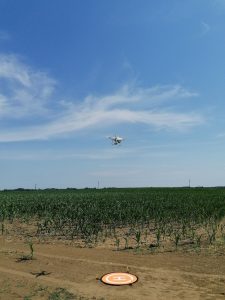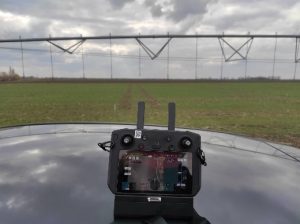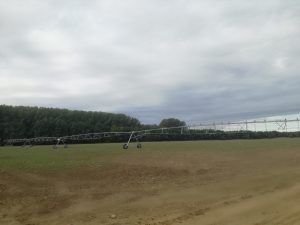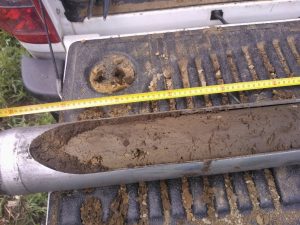
Nyírbátor, Hungary
About
Nyírbátor case study site is situated in the Pannonian region, on the edge of a moderately warm and moderately cool climate belt, at the Norther Great Plain region next to Nyírbátor city. This case study site is at a nitrate-sensitive area. It comprises of 16 ha pastureland with sprinkler irrigation for cattle grazing and 50 ha irrigated arable land with lateral moving irrigation system for feed stocks. The case study site is situated at alluvial cone plain covered mainly with quicksand. Soil is mainly sandy, sandy loam, with some loamy spots in deeper layers. Humus content is very low and underground water is in 1-3 m depth. Its active water network is sparse and drought appears mainly in July and August.
At this case study site, the utilization of alternative water resources is evaluated for irrigation. The results will contribute to the development of real-time irrigation scheduling. Regarding this goal, lot of analysis and survey were conducted before the project mid-term. During 2021, Digital Elevation Model was prepared based on LIDAR data and soil survey and soil sample analysis were made. The dewaterability characteristics of fermented sludge to be used as an alternative water source for irrigation was also assessed. The water retainer product is tested to analyse its contribution to better water balance. Soil incubation experiment and small pot experiment were made to study the effects of Water Retainer on soil conditions and nutrient status. Small pot experiment was made to study the effects of Water Retainer on soil conditions and nutrient status in a soil-plant system. Field experiments were set up to study the effects of Water Retainer on soil conditions and the nutrient uptake by the apple trees.
Tested Solution
At the Nyírbátor case study site, six WATERAGRI solutions are tested:
- Integrated physically-based terrestrial system models,
- Irrigation management and agrometeorological monitoring solutions,
- Precision irrigation system,
- Enhanced water retainer product and concept,
- Dewaterability estimation test apparatus,
- Microfluidics.
University of Debrecen from Hungary is responsible for this case study site in collaboration with the following partners: Lund University, Forschungszentrum Jülich GmbH, Alchemia Nova, The University of Salford and Bay Zoltan Alkalmazott Kutatasi Kozhasznu Nonprofit Kft.




Solution Test Progress
- Integrated physically-based terrestrial system models. PhD student from UNIDEB, Andrea Szabó was worked remotely with Forschungszentrum Jülich GmbH from May-July 2022 contributing to the development of the physically based CLM model and introducing information from the soil survey and other sensor data into the model. The model should provide improved estimates of the water balance at the case study site, which can contribute to better irrigation scheduling.
- Irrigation management and agrometeorological monitoring solutions. In 2021 and 2022, the Agricolus Irrigation management and agrometeorological monitoring solutions are tested. Basic field data were uploaded and weather station data was provided to Agricolus to integrate it to their platform. The weather data and forecast is used continously in 2021 and 2022 to monitor climate feature of the fields.
- Precision irrigation system. In 2021 and 2022, the Agricolus Precision irrigation system is tested. Basic and detailed field data were uploaded. The vegetation data is used continously in 2021 and 2022 to monitor crop of the fields for precision irrigation.
- Remote sensing pipeline. University of Debrecen contributed to remote sensing pipeline by providing field data to Vultus AB in 2021.
- Enhanced water retainer product and concept. Bay Zoltan Alkalmazott Kutatasi Kozhasznu Nonprofit Kft provided water retainer product for University of Debrecen. University of Debrecen did preliminary research on soil plant systems in 2021. Soil incubation experiment was made to study the effects of Water Retainer on soil conditions and nutrient status. Small pot experiment was made to study the effects of Water Retainer on soil physical, chemical and microbiological conditions and nutrient status in a soil-plant system. Field experiments were set up to study the effects of Water Retainer on soil physical conditions and furthermore nutrient uptake by the apple trees. In 2022 pot experiment are undergoing.
- Dewaterability estimation test apparatus (DET) was started to be implemented within the fourth quarter of 2021 and continued in 2022 in order to assess possible utilization of DET for soils. University of Lund and The University of Salford provided DET in September 2021, and test papers at the end of October 2021. University of Debrecen tested it with fermentation sludge.
- Microfluidics. In November 2021, March and July 2022 filtered fermentation sludge and irrigation water samples were provided to Microfuidics for micronutrient and micro pollutant analyses
Publications
- Assessment of Use of Remotely Sensed Vegetation to Improve Irrigation. Project Deliverable
- Andrea Szabó, Csaba Juhász, Bernadett Gálya Farkasné, Ádám Kövesdi, János Tamás, Attila Nagy. Combined traffic control of irrigation on heterogeneous field. Acta Agraria Debreceniensis. Article in Journal
- Nagy, A. Szabó, B. Gálya Farkasné, J. Tamás. Real-time spectral information to measure crop water stress for variable rate irrigation scheduling. Precision agriculture ’21. Publication in Conference Proceedings
- Attila Nagy, Andrea Szabó, Odunayo David Adeniyi, János Tamás. Wheat Yield Forecasting for the Tisza River Catchment Using Landsat 8 NDVI and SAVI Time Series and Reported Crop Statistics. Agronomy. Article in Journal
- A concept for crop evapotranspiration estimation with remote sensing. Practice Abstract






